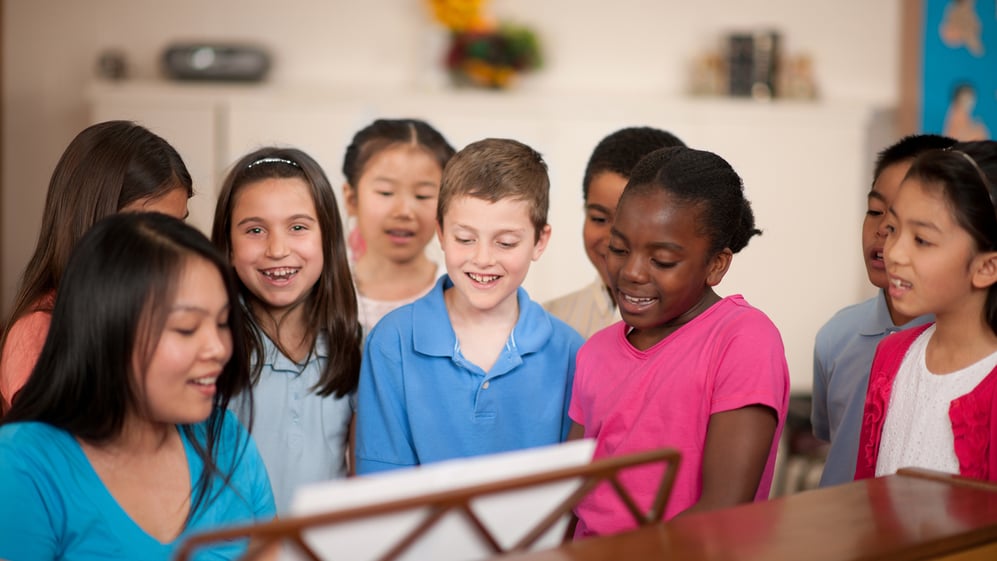Teach children difficult things. They will rise to the challenge.
My days are spent teaching hymns and liturgy to students from ages four to fourteen. I will say all day long that they can and should learn the music of the church—and the difficult music of the church, at that. Young children thrive on memorization and love to sing long, complicated words and text. Older students, while not always thrilled about learning yet another hymn, realize that learning hymns is a way of stretching and challenging themselves; that it feeds them good, robust truth instead of catering to childishness.
Our hymns often feature difficult subjects such as death, pain, persecution, and misfortune. They cover tough theological concepts, including the Trinity, Law and Gospel, angels, demons, and the work of Satan. And this is the strength of our hymnal: it expresses the truth in a nuanced manner, digging deeply and courageously into the Gospel and into the Christian life. It is good to teach our children these truths. It is good to teach our children to sing these truths and to take them to heart.
Teach them to do hymns well
Yet it is not simply enough that we teach our children to sing the truth; we also need to teach them to sing it well, with beauty and artistry. We can compare this to a child’s general education: he must learn truth, but he must also learn skills—and he must learn to do these skills well. On the one hand, some things are simply true, or they are not. You either know how to spell the word bourgeoisie, or you do not. You either know what the capital of Minnesota is, or you do not. You either know the difference between capital and capitol, or you do not. Likewise, in music, you either know what a quarter note is, or you do not. You either know after the famous opening motive that the orchestra is playing Beethoven’s Fifth, or you do not. There is not a matter of knowing these things well or badly—you simply know them.
On the other hand, education often involves skills such as drawing a self-portrait, playing sports, writing an essay, delivering a presentation, reciting a poem, or, for our special purposes, performing a piece of music. It is essential that we teach children to do these things well, even it if means we have to tell them they are doing it badly at first. Having a child do something well is, first and foremost, a good teaching practice. A teacher should have high expectations for the students in her class so that they have the opportunity to rise to those expectations.
What is the purpose of doing hymns well?
But why do we want children to rise to these high expectations? Specifically, in music, why are we not content with simply knowing that a child has memorized the words of a hymn? Why does the artfulness and beauty of their singing matter?
As a teacher, I want to challenge my students. They will never improve in their education if they are not pushed to do their best. And, essentially, that is why we should teach our children to sing hymns and liturgy well. Not just to memorize them, but to sing them beautifully. We want them to be better. We want them to see what it is to do something with grace and self-control and not in an obnoxious and overbearing manner.
But there is something more here than simply improving a child’s skill level or moral character. We teach them to sing well because what they are singing deserves to be sung well. It is something outside the child—something outside their ability, their pride, and their personal ambition for good grades. When we are teaching our children hymns and liturgy, we are teaching them the most important thing—the Gospel of Jesus Christ.
Teaching beauty and artistry in hymn music
I once heard some children singing the liturgy for Matins when I was visiting a church in another state. Although I was pleased that they had the liturgy memorized and were singing it with gusto, it was clear that they had not learned to sing it artfully. The children were overpowering every other adult in the room, and they lacked a proper melodious tone. In fact, they were downright distracting. While they knew the text and, I’m sure, were coached in its meaning, they seemed to struggle to deliver it reverently. It had become all about the fact that they had the text memorized and little about how to treat the text.
Far be it from me to suggest that the text of hymns and the liturgy only matter if they are sung beautifully. The text of our Divine Service, taken directly from the Holy Scriptures, is living and active and moves hearts despite our paltry human endeavors to sing it with the beauty it deserves. But we have been given the Good News—we have been given truth, and a hope that does not disappoint, and true, lasting joy. Why would we then subject that message to monotone shouting and tuneless droning? Let us instead bedeck it with the jewels of melody and harmony and the rich dress of tuneful, blending voices.
Do I say this to shame those less musically inclined? Not at all! I know many wonderful, faithful Christians who simply are not skilled in music. But I am a music teacher, and my job is to teach children not just to sing but also to sing well. Although I cannot give individualized voice lessons to 192 students, I can tell my students truthfully whether they sound good. I can tell my exuberant first graders that I love their enthusiasm but that shouting a hymn at the top of their lungs is simply unacceptable. I can make my middle schoolers sing a hymn stanza again and again and again and again until they finally blend just right. I can hold even my youngest students to a higher standard than simply “cute kids singing as loudly and excitedly as possible.”
Is it hard? Often. But my students know I am holding them to a higher standard because the thing they are singing is of the utmost importance. They don’t shy away from the challenge of singing well.
So let us rise to the challenge. Let us teach difficult things. And let us teach our children how to do difficult things well.
May God grant us the courage to do so in love and in truth.
To start teaching children in choir, check out The Concordia Children's Choir Book with six different pieces of music for your students to learn.












